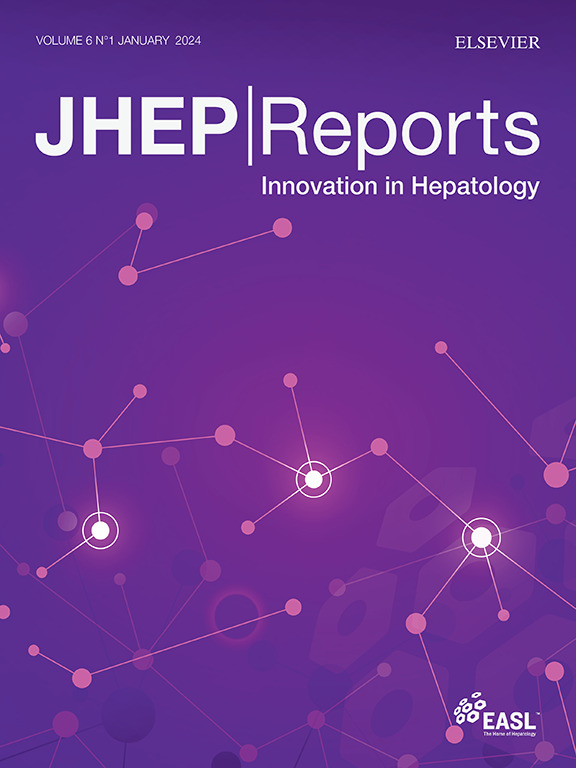新辅助atezolizumab联合贝伐单抗治疗肝细胞癌肝移植
IF 9.5
1区 医学
Q1 GASTROENTEROLOGY & HEPATOLOGY
引用次数: 0
摘要
背景,atezolizumab和bevacizumab的联合治疗为晚期肝细胞癌(HCC)提供了一种新的免疫调节方法,显示出疗效。对移植物安全性和排斥反应的担忧限制了其在肝移植(LT)新辅助治疗中的探索。在这项研究中,我们研究了移植前给药atezolizumab和bevacizumab治疗HCC的临床疗效和安全性。在此,我们对17例HCC患者进行了前瞻性评估,这些患者于2020年12月和2023年12月在7个西方移植中心接受了新辅助术前阿特唑单抗和贝伐单抗治疗。结果在纳入研究的17例HCC患者中,16例(94.1%)存在米兰标准以外的肿瘤负担。新辅助局部治疗联合阿特唑单抗+贝伐单抗(中位:5个月;在LT前至少4周停止治疗)导致客观缓解率为94%(完全缓解:59%),降低分期至米兰标准(82%),外植体检查时病理反应为88%。3-4级治疗相关不良事件占17.6%的病例,并且是可控的。在25个月的中位随访期间,报告了2例轻度(排斥反应活性指数≤4),活检证实的排斥反应,但没有报告严重的同种异体排斥反应或移植物丢失。术后1年和3年生存率分别为94.2%和88.2%。本研究强调了在肝移植前,阿特唑单抗和贝伐单抗治疗相关的有利肿瘤和生存结果。就治疗相关不良事件而言,这种基于免疫的组合是安全的,并且没有严重的移植后排斥反应或移植物丢失。这些初步结果可以为扩大晚期HCC患者的移植资格标准铺平道路。影响和意义:尽管atezolizumab和bevacizumab在肝细胞癌肝移植前的新辅助治疗中具有增强抗肿瘤反应和降低分期的潜力,但由于对其安全性的担忧,关于atezolizumab和bevacizumab联合应用的研究受到限制。在接受新辅助治疗atezolizumab/bevacizumab后成功进行肝移植的17例患者中,82%的患者达到了米兰标准的降期,94%的放射客观反应和88%的病理反应,没有因治疗相关不良事件或移植物丢失而退出。肝细胞癌肝移植前新辅助联合atezolizumab +贝伐单抗显示出令人鼓舞的安全性,并作为一种有希望的移植前优化治疗脱颖而出,导致肿瘤预后改善。本文章由计算机程序翻译,如有差异,请以英文原文为准。

Neoadjuvant atezolizumab plus bevacizumab prior liver transplantation for hepatocellular carcinoma
Background & Aims
The combination of atezolizumab and bevacizumab offers a novel approach to immunomodulation, showing efficacy as a primary treatment in advanced hepatocellular carcinoma (HCC). Concerns about graft safety and rejection have limited its exploration in the neoadjuvant setting of liver transplantation (LT). In this study, we investigate the clinical efficacy and the safety profile of pre-transplant administration of atezolizumab and bevacizumab for HCC.
Methods
Herein, we performed a prospective assessment of 17 patients with HCC treated with neoadjuvant preoperative atezolizumab and bevacizumab prior to LT for HCC, obtained from December 2020 and December 2023 at seven Western transplant centers.
Results
Among the 17 patients with HCC included in the study, 16 (94.1%) had a tumor burden outside of Milan criteria. Neoadjuvant locoregional therapies along with the administration of atezolizumab plus bevacizumab (median: 5 months; discontinued at least 4 weeks prior to LT) led to an objective response rate of 94% (complete response: 59%), downstaging to within Milan criteria (82%) and a pathological response at explant examination of 88%. Grade 3-4 treatment-related adverse events accounted for 17.6% of cases and were manageable. During the 25-month median follow-up period, two cases of mild (rejection activity index ≤4), biopsy-proven rejection were reported but no instances of severe allograft rejection or graft loss were reported. The 1-year and 3-year post-LT survival rates were 94.2% and 88.2%, respectively.
Conclusions
This study highlights the favorable oncological and survival outcomes associated with atezolizumab and bevacizumab treatment in the pre-LT setting. This immune-based combination was safe in terms of treatment-related adverse events, and absence of severe post-transplant rejection or graft loss. These preliminary results could pave the way for expanding transplant eligibility criteria in patients at more advanced HCC stages.
Impact and Implications:
Studies on the combination of atezolizumab and bevacizumab in the neoadjuvant setting prior to liver transplantation for hepatocellular carcinoma have been limited, despite its potential to enhance anti-tumor responses and downstaging, owing to concerns about its safety profile. Among 17 patients who underwent successful liver transplantation following neoadjuvant atezolizumab/bevacizumab, 82% achieved downstaging to within Milan criteria, 94% radiological objective response and 88% pathology response, without drop-outs due to treatment-related adverse events or graft loss. The neoadjuvant combination of atezolizumab plus bevacizumab prior to liver transplantation for hepatocellular carcinoma shows an encouraging safety profile and stands out as a promising pre-transplant optimization treatment, leading to improved oncological outcomes.
求助全文
通过发布文献求助,成功后即可免费获取论文全文。
去求助
来源期刊

JHEP Reports
GASTROENTEROLOGY & HEPATOLOGY-
CiteScore
12.40
自引率
2.40%
发文量
161
审稿时长
36 days
期刊介绍:
JHEP Reports is an open access journal that is affiliated with the European Association for the Study of the Liver (EASL). It serves as a companion journal to the highly respected Journal of Hepatology.
The primary objective of JHEP Reports is to publish original papers and reviews that contribute to the advancement of knowledge in the field of liver diseases. The journal covers a wide range of topics, including basic, translational, and clinical research. It also focuses on global issues in hepatology, with particular emphasis on areas such as clinical trials, novel diagnostics, precision medicine and therapeutics, cancer research, cellular and molecular studies, artificial intelligence, microbiome research, epidemiology, and cutting-edge technologies.
In summary, JHEP Reports is dedicated to promoting scientific discoveries and innovations in liver diseases through the publication of high-quality research papers and reviews covering various aspects of hepatology.
 求助内容:
求助内容: 应助结果提醒方式:
应助结果提醒方式:


